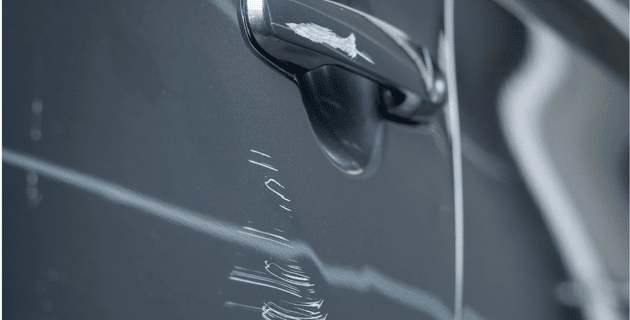What’s more frustrating than returning to your car after shopping, and noticing a new door ding or scratch? Whether it was the car next to you, a runaway shopping cart, or a careless passerby… unfortunately dings happen.
While dings are inevitable, you can take steps to avoid them. Here are some proven tips and tactics to help protect your vehicle.
Park in an end spot.
In general, parking as far away from other cars as possible will help to minimize the chance of dings. If you’re in the end spot, you have the added protection of only having one side of the car next to another vehicle. Park as close to the outer edge as you can, which will give you an extra foot of space between you and the other car. Hopefully, that’s plenty of room to avoid swinging car doors.
Open your door slowly.
While some dings happen to us, we also can cause others. Being aware of your surroundings and opening your car door slowly will help you exit without hitting anything.
Look for the lines.
Parking lot lines are supposed to keep everyone lined up neatly in their own spaces. That’s not always the case. Avoid those spots where people are over the lines or positioned at a strange angle. That’s a sign they may not be as careful around your car. Also, avoid parking in tight spaces. Even if you can navigate those, the cars around you may not do as well.
Stay away from shopping cart return areas.
Runaway shopping carts are a key cause of dents and dings. Park far away to put as much distance between your car and the carts as possible.
Park beside a car in great condition.
You can tell by the condition of a perfectly clean and waxed car that it is well-maintained. Look for those cars in the lot and park next to them. Chances are the owner will take great care in not dinging his car or yours. Similarly, you’ll want to park away from those cars that have lots of dents and dings. Those owners probably don’t even notice and may take less care.
Avoid parking on the same side as a child safety seat.
Sometimes people can scratch or dent your car without meaning to do so, such as exuberant children and parents balancing too much. You may be able to avoid such situations by looking at the placement of the child safety seat in the neighboring car. Try not to park on the same side as the seat. Chances are that’s the side where parents and children will be congregating.
Pro Tip: Parents, teach your kids safety in and around vehicles.
Stay away from busy walkways.
Skateboarders and bicycle riders can whiz by your car and accidentally knock into it. Pedestrians also can scratch your car as they squeeze by. Park away from busy walkways so these encounters are less of a possibility.
Use covered parking.
Dings and dents are sometimes weather-related. Avoid damage from hail and other weather events by parking in a garage or other covered option. Alternatively, you can use a car cover to protect your vehicle. See our related blog on protecting your car from spring storms, too.
Pay attention to your surroundings.
It’s easy enough to brush by something and scratch your car. That’s why paying attention to your surroundings in a parking lot is your best defense. Look out for tall curbs, signs, light posts, walls, and cement pillars. Take steps to avoid them and a potential parking lot accident.
Do not park sideways.
You may have seen cars parked sideways or diagonally, taking up multiple parking spots. While in theory, it prevents anyone from parking near them, in practice, it’s considered a “jerk” move. There have been cases where people have targeted a car just because someone parked it that way.
Finally, while you can use insurance to fix door dings, most repairs are not much more than your deductible. You’ll probably be paying out-of-pocket. The good news is that modern technology has made it possible for paintless dent removal. It’s eco-friendly and usually less expensive than a body shop repair.
This article is furnished by California Casualty, providing auto and home insurance to educators, law enforcement officers, firefighters, and nurses. Get a quote at 1.866.704.8614 or www.calcas.com.
- Graduation – When to Remove Your Child from Your Auto Policy - May 18, 2023
- How to Prevent Catalytic Converter Theft - May 17, 2023
- How Much Does Home Insurance Cost? - May 17, 2023

